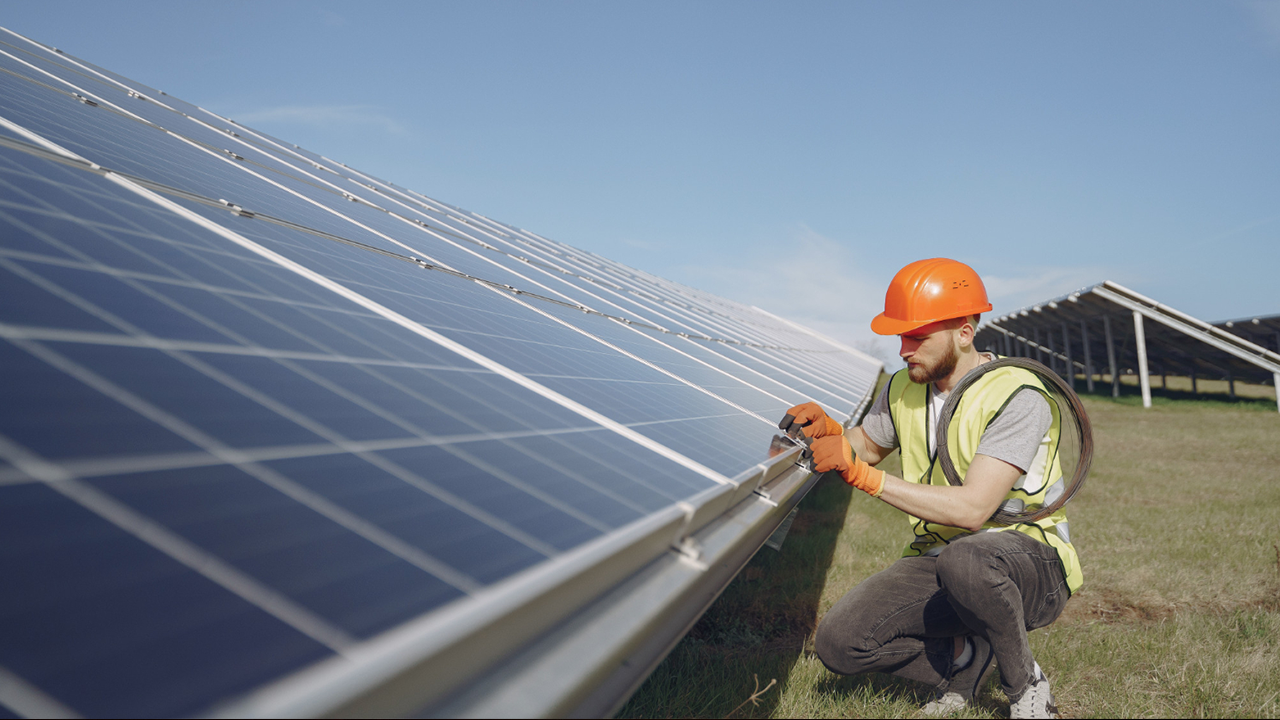Solar energy has experienced an average annual growth of 28% as of 2023. Federal tax incentives and carbon reduction goals have helped lower solar installation costs as demand continues to grow.
Both the private and public sectors have helped drive this growth, leading to an increase in job opportunities. There may be a job that suits your interests and your education level.
Solar Jobs That Get You Started Fast
Not all solar energy jobs require you to have a degree or a lot of experience. Entry-level positions in solar energy firms may only require a high school diploma and experience working in general construction.
When it comes to entry-level positions, companies often prefer to train in-house using their preferred materials.
Entry-level Solar Panel Installer (Photovoltaic Installer)
- Average annual salary: $35,000 – $48,000
Working as a Photovoltaic (PV) Installer under a solar installation contractor, you would be responsible for assembling and installing photovoltaic systems on roofs or other structures where solar energy can be collected and converted into electricity.
Many trade and technical schools offer courses, but some large firms hire high school graduates and provide on-the-job training. You can also move up into supervisory positions as you gain experience.
Warehouse & Inventory Associate
- Average annual salary: $30,000 – $45,000
Working in conjunction with the solar panel installers and technicians, warehouse and inventory associates manage the inventory of parts, panels, and materials in a solar company’s warehouse.
They ensure there is adequate stock for new customers to have panels installed and replacement parts when technicians need them for repairs.
Construction Laborer with Solar Focus
- Average annual salary: $40,000 – $60,000
A solar construction laborer or carpenter with a solar focus assists in building solar farms and preparing sites for installations.
With this job, you’re taking on an extremely important position related to maintaining structural and supports using wood, metal, and concrete for all solar projects.
The position may be entry-level with previous solar experience or a mid-level construction laborer moving laterally to focus on solar farms. Some construction laborers may begin their careers as assistants or helpers in other areas.
Roofing Assistant/Helper
- Average annual salary: $30,000 – $50,000
This is a physically demanding job that requires excellent teamwork skills and the ability to follow instructions.
As a roofing assistant or helper, you support the roofing work that’s critical to rooftop and carport PV installation.
Your tasks could include assisting with site preparation, job site management, basic roofing tasks, and handling and transporting materials.
Skilled Trade Jobs in the Solar Industry
Many trade jobs in the solar industry and renewable energy sector as a whole require you to have at least a two-year technical diploma or similar degree in energy before being hired.
Some businesses train employees in-house, relying on prior hands-on experience in trades like construction or electrical work.. While having solar experience is preferable, working in any energy-related job can be beneficial.
Solar Engineer
- Average annual salary: $85,000 – $130,000
Solar engineers specialize in the design and optimization of solar systems for maximum performance. Essentially, they specialize in using sunlight to generate electricity.
Their training enables them to plan, design, and execute projects. Engineers often work with technicians to install and operate solar systems successfully.
The solar energy industry employs many different engineers primarily in the manufacturing sector, including:
- Mechanical engineers
- Electrical engineers
- Environmental engineers
- Industrial engineers
Solar Installation Contractor
- Average annual salary: $100,000
As a solar installation contractor, you take on a managerial role, preparing bids to compete for projects while planning and directing solar installation projects. This role typically requires obtaining a bachelor’s degree or achieving your apprentice or journey-level certification.
You often hire and organize work crews to install the solar panels, wire them, and weld any necessary components. Part of this job involves being very organized and deadline-oriented, establishing schedules and managing deadlines while ensuring quality work is completed.
Electrician (Solar Specialization)
- Average Annual Salary: $60,000
Electricians who specialize in solar systems and installations may be hired to install wiring, inverters, and connect multiple solar panels to the grid.
You may also be responsible for repairing and replacing wiring in solar panels that have already been installed, and regularly testing and diagnosing any wiring issues.
HVAC Technician (Solar-Thermal Systems)
- Average annual salary: $50,000 – $60,000
Working with solar heating and cooling systems, HVAC (heating, ventilation, air-conditioning) technicians utilize their specialized knowledge to perform solar-powered installations, which often include water heating, and make necessary repairs.
As an HVAC technician specializing in solar thermal systems, you may also help manage whole-building systems as solar energy is integrated into residential grids.
Maintenance Technician
- Average annual salary: $50,000
After solar panels are installed, as a maintenance technician, you would perform regular checks and attend to any necessary repairs to keep the system functioning properly throughout its entire lifecycle.
Office and Administrative Roles in Solar
If you prefer the administrative side of solar energy and want to make a difference from a desktop instead of out in the field, these jobs might be for you.
Project Coordinator/Scheduler
- Average annual salary: $50,000 – $58,000
This role involves heavy administrative work. As a project coordinator, you are responsible for ensuring that solar projects are completed on time and within budget by coordinating all aspects of each project.
Customer Support Specialist
- Average annual salary: $40,000
A job that is available at several companies, the customer support specialist in a solar energy firm handles customer questions, billing inquiries, and provides post-installation support. They are the frontline between the customer and technical support.
Permitting and Compliance Associate
- Average annual salary: $55,000 – $60,000
Pre and post-installation require permits and legal regulations that must be followed.
You ensure projects meet all legal, zoning, and environmental rules before panels are installed and solar farms are designed.
Sales, Marketing, and Education Jobs
If you prefer working directly with consumers instead of participating in the installation process, consider a career in sales, marketing, or education. All of these jobs prioritize excellent communication skills and in-depth knowledge of solar energy.
Solar Sales Representative
- Average annual salary: $60,000 – $110,000 (based on commission)
Operating out of the business, a solar sales representative sells residential and commercial solar solutions. You may have sales experience or transition into sales from a background as a technician or installer. Companies may pay by the hour, by commission, or a blend of both.
While this position used to be an entry-level role that didn’t require additional education, you may now need an associate’s or bachelor’s degree to be considered for hire.
Community Outreach/Education Roles
- Average annual salary: $50,000
A key educational role, this position educates the public and other organizations about the benefits of solar energy and the importance of renewable energy. This may involve trips to schools, groups, or presentations at energy conferences.
Technical Jobs for Designers and Analysts
Although these jobs all require different amounts of experience, they also share the need for a post-secondary credential.
If you’re interesting in one of these positions, you might apply after gaining industry-specific training and certification, or wait to obtain a full undergraduate and graduate degree.
Solar Site Assessor
- Average annual salary: $35,000 – $60,000
During the planning stage, you assess potential solar installation sites, either in person or through remote evaluation.
You identify potential opportunities and recommend the best designs for each location. Then, you provide verbal and written feedback.
CAD Designer/Drafter
- Average annual salary: $60,000
Requiring a degree and relevant experience to demonstrate technical knowledge, your role as a CAD designer or drafter involves creating technical drawings for solar farms.
This role collaborates with assessors and engineers to ensure component sizing and design match the specific site location. You could create solar carports, ground-mounted arrays, and rooftop systems.
Data Analyst (Performance and Efficiency)
- Average annual salary: $70,000
As a data analyst, you monitor solar system performance using industry data and recommend improvements based on your findings.
This data may be factored into the other roles in this category to ensure the solar system is highly efficient.
How to Break Into the Solar Industry
Breaking into the solar industry can happen in a few different ways.
- Change Sectors: Some people may transition from an existing energy sector, such as oil and gas, or shift from wind to solar.
- Hands-on Training: Additionally, consider apprenticeships, certificate programs, or internships to help you make connections and secure a job that aligns with your experience and educational level.
- Education: Entry-level positions, such as solar installers, often require only a high school diploma, while others may require a bachelor’s degree or a certificate from trade school.
- Paid Training: If you’re looking to get into construction or installation, consider large and international companies that will offer paid training to those who have some construction experience.
- Make Connections: Take advantage of networking events, online resources, and local energy fairs or green job expos to expand your professional network.
All of these experiences can put you in contact with those people already in the industry who may be willing to help someone break into it.
Conclusion
The solar sector is a thriving industry that is set to grow even more as people choose renewable energy over oil and gas.
Many of these positions are unique to the solar industry, but others may be suitable for individuals with construction or administrative experience who are willing to undergo specialized solar training.
If you’re looking to take another step toward a solar energy career, check out Energy Job Search.








